Case Study: Chronic Renal Failure, Diabetes, and Nursing Interventions
VerifiedAdded on 2023/04/20
|10
|2413
|225
Case Study
AI Summary
This nursing assignment presents a detailed case study of a 31-year-old Australian woman, Mrs. N, diagnosed with chronic renal failure and uncontrolled diabetes, with a history of diabetes mellitus type 1, tobacco and alcohol addiction, and a family history of diabetes and heart disorders. The case study focuses on her treatment with Epoetin Alfa, a medication used to manage anemia associated with chronic renal failure. It explores the rationale for administration, indications, safety requirements, and patient education. The assignment also covers contraindications, potential side effects, nursing interventions based on NMBA standards, and adherence to National Safety and Quality Health Service Standards, specifically medication safety and patient identification. The learning outcomes highlight the importance of thorough patient assessment, understanding medication implications, and providing comprehensive patient care, including the need for detailed medical history review and documentation. The assignment includes references to support the information provided.
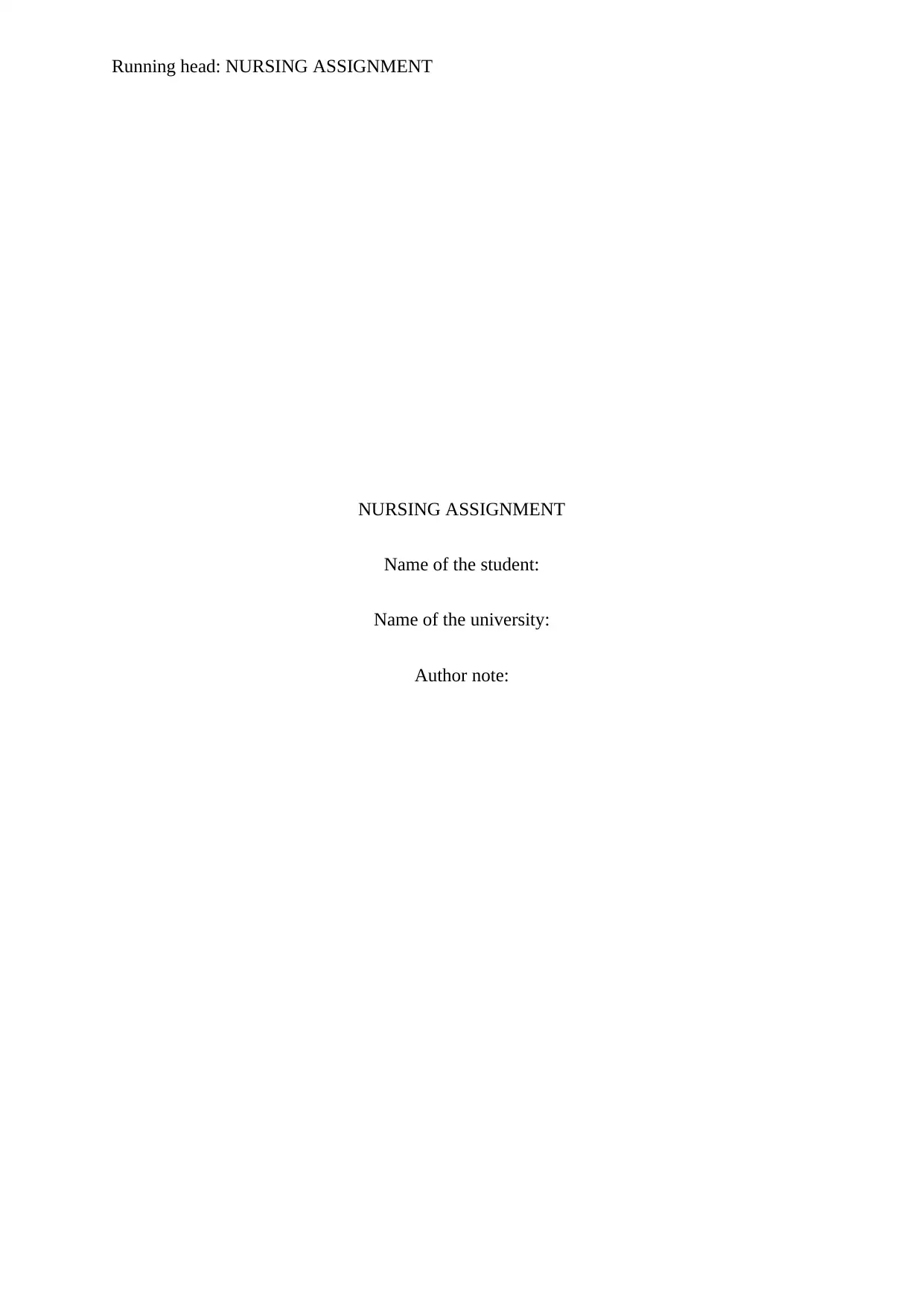
Running head: NURSING ASSIGNMENT
NURSING ASSIGNMENT
Name of the student:
Name of the university:
Author note:
NURSING ASSIGNMENT
Name of the student:
Name of the university:
Author note:
Paraphrase This Document
Need a fresh take? Get an instant paraphrase of this document with our AI Paraphraser
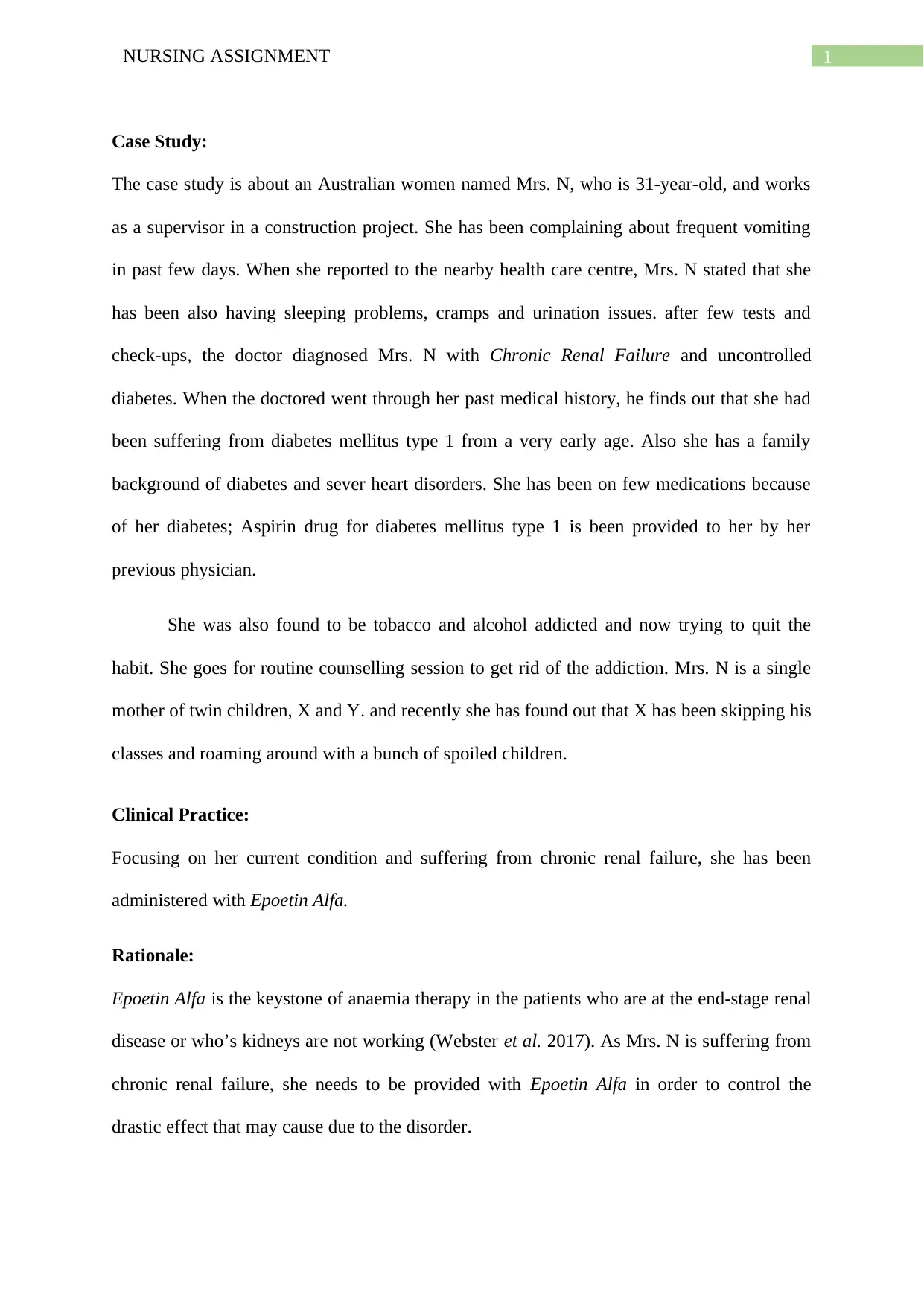
1NURSING ASSIGNMENT
Case Study:
The case study is about an Australian women named Mrs. N, who is 31-year-old, and works
as a supervisor in a construction project. She has been complaining about frequent vomiting
in past few days. When she reported to the nearby health care centre, Mrs. N stated that she
has been also having sleeping problems, cramps and urination issues. after few tests and
check-ups, the doctor diagnosed Mrs. N with Chronic Renal Failure and uncontrolled
diabetes. When the doctored went through her past medical history, he finds out that she had
been suffering from diabetes mellitus type 1 from a very early age. Also she has a family
background of diabetes and sever heart disorders. She has been on few medications because
of her diabetes; Aspirin drug for diabetes mellitus type 1 is been provided to her by her
previous physician.
She was also found to be tobacco and alcohol addicted and now trying to quit the
habit. She goes for routine counselling session to get rid of the addiction. Mrs. N is a single
mother of twin children, X and Y. and recently she has found out that X has been skipping his
classes and roaming around with a bunch of spoiled children.
Clinical Practice:
Focusing on her current condition and suffering from chronic renal failure, she has been
administered with Epoetin Alfa.
Rationale:
Epoetin Alfa is the keystone of anaemia therapy in the patients who are at the end-stage renal
disease or who’s kidneys are not working (Webster et al. 2017). As Mrs. N is suffering from
chronic renal failure, she needs to be provided with Epoetin Alfa in order to control the
drastic effect that may cause due to the disorder.
Case Study:
The case study is about an Australian women named Mrs. N, who is 31-year-old, and works
as a supervisor in a construction project. She has been complaining about frequent vomiting
in past few days. When she reported to the nearby health care centre, Mrs. N stated that she
has been also having sleeping problems, cramps and urination issues. after few tests and
check-ups, the doctor diagnosed Mrs. N with Chronic Renal Failure and uncontrolled
diabetes. When the doctored went through her past medical history, he finds out that she had
been suffering from diabetes mellitus type 1 from a very early age. Also she has a family
background of diabetes and sever heart disorders. She has been on few medications because
of her diabetes; Aspirin drug for diabetes mellitus type 1 is been provided to her by her
previous physician.
She was also found to be tobacco and alcohol addicted and now trying to quit the
habit. She goes for routine counselling session to get rid of the addiction. Mrs. N is a single
mother of twin children, X and Y. and recently she has found out that X has been skipping his
classes and roaming around with a bunch of spoiled children.
Clinical Practice:
Focusing on her current condition and suffering from chronic renal failure, she has been
administered with Epoetin Alfa.
Rationale:
Epoetin Alfa is the keystone of anaemia therapy in the patients who are at the end-stage renal
disease or who’s kidneys are not working (Webster et al. 2017). As Mrs. N is suffering from
chronic renal failure, she needs to be provided with Epoetin Alfa in order to control the
drastic effect that may cause due to the disorder.
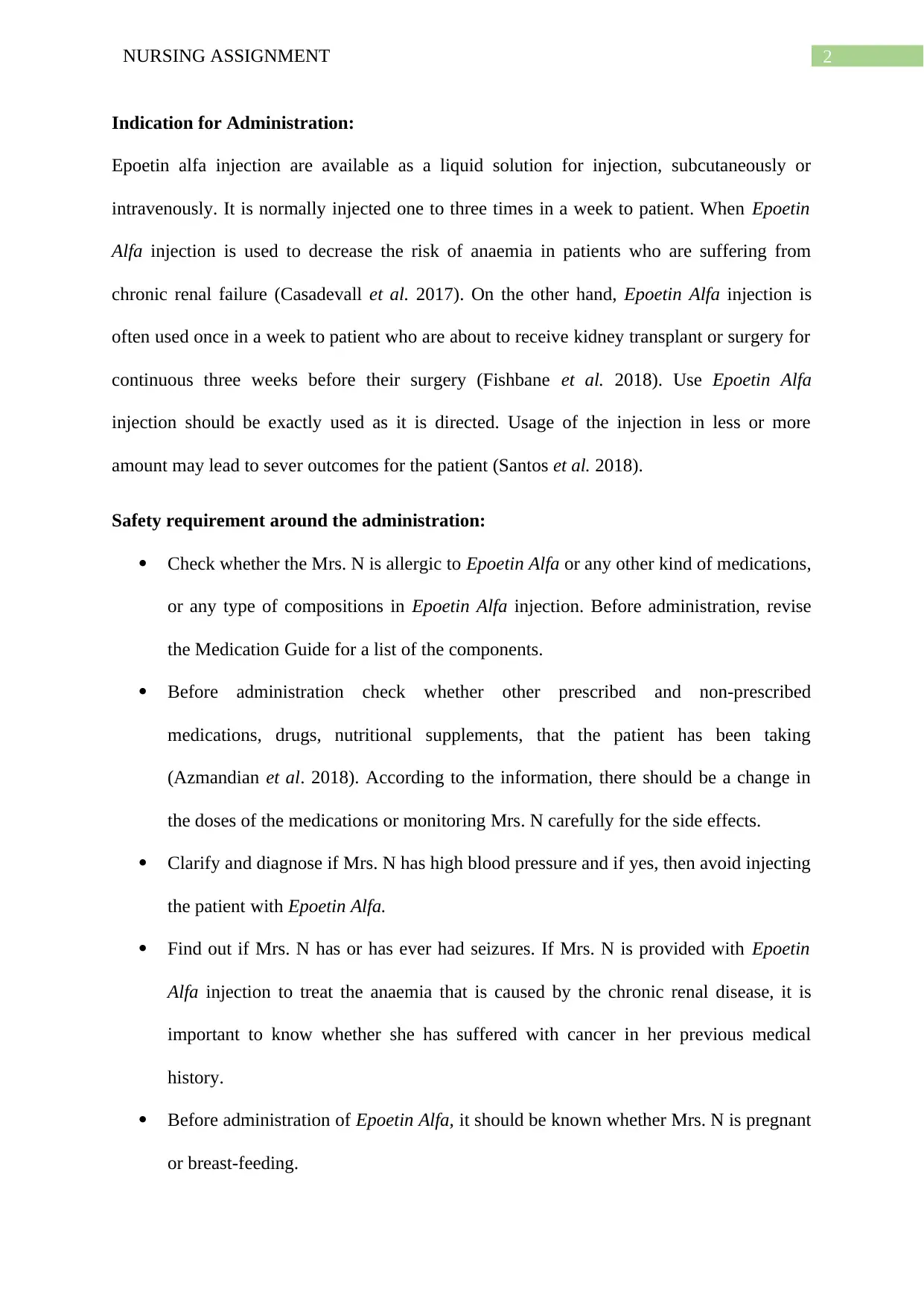
2NURSING ASSIGNMENT
Indication for Administration:
Epoetin alfa injection are available as a liquid solution for injection, subcutaneously or
intravenously. It is normally injected one to three times in a week to patient. When Epoetin
Alfa injection is used to decrease the risk of anaemia in patients who are suffering from
chronic renal failure (Casadevall et al. 2017). On the other hand, Epoetin Alfa injection is
often used once in a week to patient who are about to receive kidney transplant or surgery for
continuous three weeks before their surgery (Fishbane et al. 2018). Use Epoetin Alfa
injection should be exactly used as it is directed. Usage of the injection in less or more
amount may lead to sever outcomes for the patient (Santos et al. 2018).
Safety requirement around the administration:
Check whether the Mrs. N is allergic to Epoetin Alfa or any other kind of medications,
or any type of compositions in Epoetin Alfa injection. Before administration, revise
the Medication Guide for a list of the components.
Before administration check whether other prescribed and non-prescribed
medications, drugs, nutritional supplements, that the patient has been taking
(Azmandian et al. 2018). According to the information, there should be a change in
the doses of the medications or monitoring Mrs. N carefully for the side effects.
Clarify and diagnose if Mrs. N has high blood pressure and if yes, then avoid injecting
the patient with Epoetin Alfa.
Find out if Mrs. N has or has ever had seizures. If Mrs. N is provided with Epoetin
Alfa injection to treat the anaemia that is caused by the chronic renal disease, it is
important to know whether she has suffered with cancer in her previous medical
history.
Before administration of Epoetin Alfa, it should be known whether Mrs. N is pregnant
or breast-feeding.
Indication for Administration:
Epoetin alfa injection are available as a liquid solution for injection, subcutaneously or
intravenously. It is normally injected one to three times in a week to patient. When Epoetin
Alfa injection is used to decrease the risk of anaemia in patients who are suffering from
chronic renal failure (Casadevall et al. 2017). On the other hand, Epoetin Alfa injection is
often used once in a week to patient who are about to receive kidney transplant or surgery for
continuous three weeks before their surgery (Fishbane et al. 2018). Use Epoetin Alfa
injection should be exactly used as it is directed. Usage of the injection in less or more
amount may lead to sever outcomes for the patient (Santos et al. 2018).
Safety requirement around the administration:
Check whether the Mrs. N is allergic to Epoetin Alfa or any other kind of medications,
or any type of compositions in Epoetin Alfa injection. Before administration, revise
the Medication Guide for a list of the components.
Before administration check whether other prescribed and non-prescribed
medications, drugs, nutritional supplements, that the patient has been taking
(Azmandian et al. 2018). According to the information, there should be a change in
the doses of the medications or monitoring Mrs. N carefully for the side effects.
Clarify and diagnose if Mrs. N has high blood pressure and if yes, then avoid injecting
the patient with Epoetin Alfa.
Find out if Mrs. N has or has ever had seizures. If Mrs. N is provided with Epoetin
Alfa injection to treat the anaemia that is caused by the chronic renal disease, it is
important to know whether she has suffered with cancer in her previous medical
history.
Before administration of Epoetin Alfa, it should be known whether Mrs. N is pregnant
or breast-feeding.
⊘ This is a preview!⊘
Do you want full access?
Subscribe today to unlock all pages.

Trusted by 1+ million students worldwide
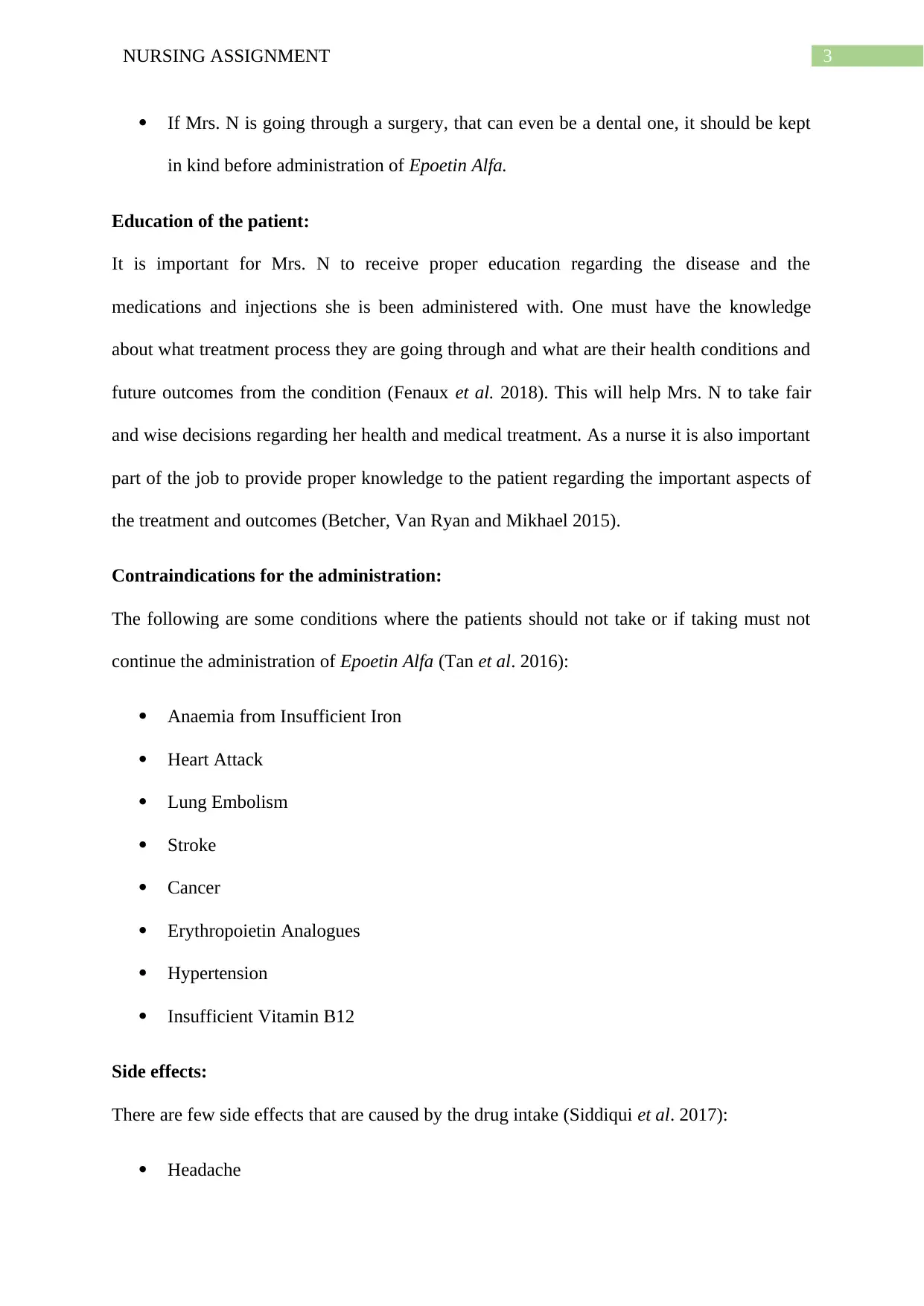
3NURSING ASSIGNMENT
If Mrs. N is going through a surgery, that can even be a dental one, it should be kept
in kind before administration of Epoetin Alfa.
Education of the patient:
It is important for Mrs. N to receive proper education regarding the disease and the
medications and injections she is been administered with. One must have the knowledge
about what treatment process they are going through and what are their health conditions and
future outcomes from the condition (Fenaux et al. 2018). This will help Mrs. N to take fair
and wise decisions regarding her health and medical treatment. As a nurse it is also important
part of the job to provide proper knowledge to the patient regarding the important aspects of
the treatment and outcomes (Betcher, Van Ryan and Mikhael 2015).
Contraindications for the administration:
The following are some conditions where the patients should not take or if taking must not
continue the administration of Epoetin Alfa (Tan et al. 2016):
Anaemia from Insufficient Iron
Heart Attack
Lung Embolism
Stroke
Cancer
Erythropoietin Analogues
Hypertension
Insufficient Vitamin B12
Side effects:
There are few side effects that are caused by the drug intake (Siddiqui et al. 2017):
Headache
If Mrs. N is going through a surgery, that can even be a dental one, it should be kept
in kind before administration of Epoetin Alfa.
Education of the patient:
It is important for Mrs. N to receive proper education regarding the disease and the
medications and injections she is been administered with. One must have the knowledge
about what treatment process they are going through and what are their health conditions and
future outcomes from the condition (Fenaux et al. 2018). This will help Mrs. N to take fair
and wise decisions regarding her health and medical treatment. As a nurse it is also important
part of the job to provide proper knowledge to the patient regarding the important aspects of
the treatment and outcomes (Betcher, Van Ryan and Mikhael 2015).
Contraindications for the administration:
The following are some conditions where the patients should not take or if taking must not
continue the administration of Epoetin Alfa (Tan et al. 2016):
Anaemia from Insufficient Iron
Heart Attack
Lung Embolism
Stroke
Cancer
Erythropoietin Analogues
Hypertension
Insufficient Vitamin B12
Side effects:
There are few side effects that are caused by the drug intake (Siddiqui et al. 2017):
Headache
Paraphrase This Document
Need a fresh take? Get an instant paraphrase of this document with our AI Paraphraser
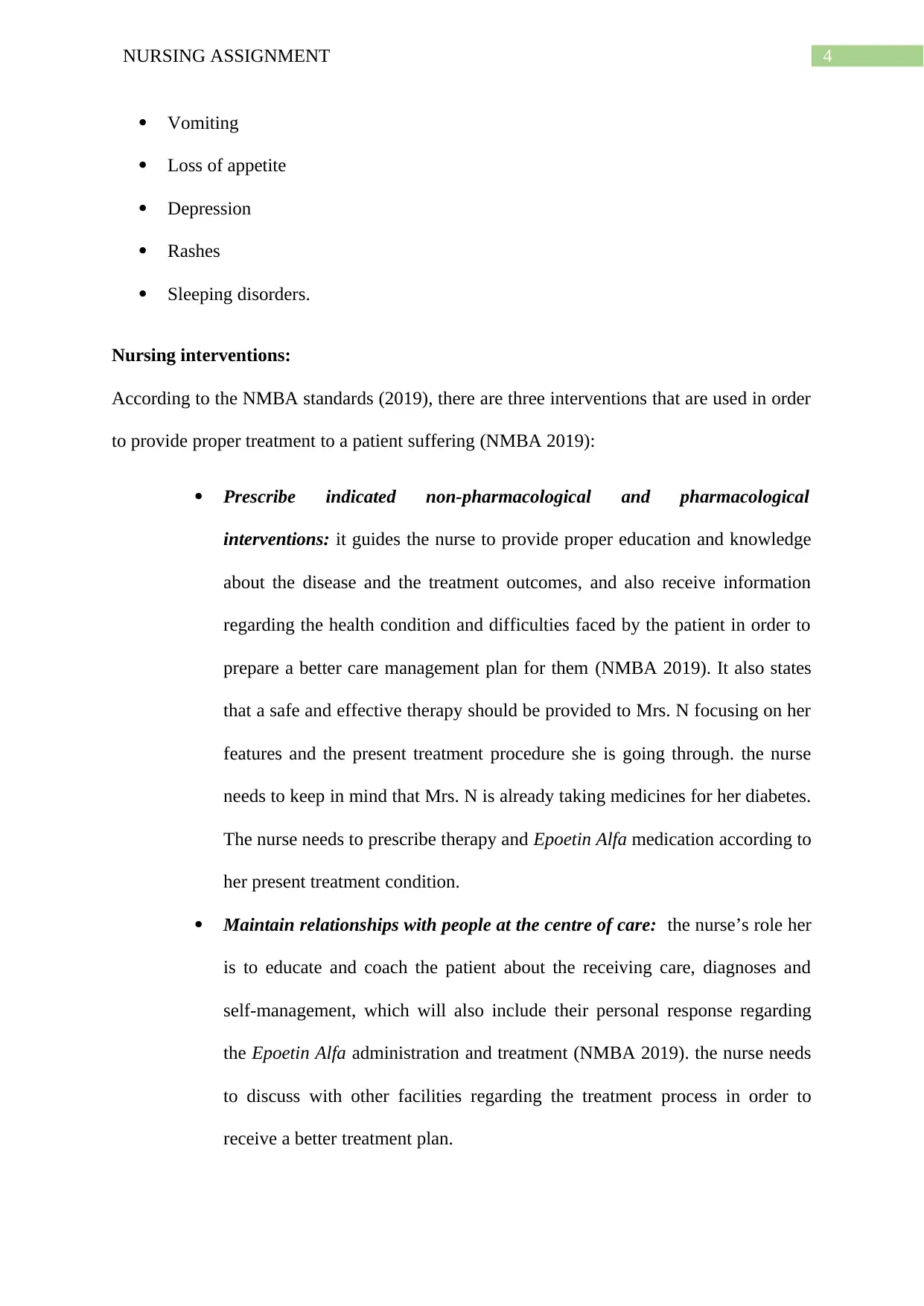
4NURSING ASSIGNMENT
Vomiting
Loss of appetite
Depression
Rashes
Sleeping disorders.
Nursing interventions:
According to the NMBA standards (2019), there are three interventions that are used in order
to provide proper treatment to a patient suffering (NMBA 2019):
Prescribe indicated non-pharmacological and pharmacological
interventions: it guides the nurse to provide proper education and knowledge
about the disease and the treatment outcomes, and also receive information
regarding the health condition and difficulties faced by the patient in order to
prepare a better care management plan for them (NMBA 2019). It also states
that a safe and effective therapy should be provided to Mrs. N focusing on her
features and the present treatment procedure she is going through. the nurse
needs to keep in mind that Mrs. N is already taking medicines for her diabetes.
The nurse needs to prescribe therapy and Epoetin Alfa medication according to
her present treatment condition.
Maintain relationships with people at the centre of care: the nurse’s role her
is to educate and coach the patient about the receiving care, diagnoses and
self-management, which will also include their personal response regarding
the Epoetin Alfa administration and treatment (NMBA 2019). the nurse needs
to discuss with other facilities regarding the treatment process in order to
receive a better treatment plan.
Vomiting
Loss of appetite
Depression
Rashes
Sleeping disorders.
Nursing interventions:
According to the NMBA standards (2019), there are three interventions that are used in order
to provide proper treatment to a patient suffering (NMBA 2019):
Prescribe indicated non-pharmacological and pharmacological
interventions: it guides the nurse to provide proper education and knowledge
about the disease and the treatment outcomes, and also receive information
regarding the health condition and difficulties faced by the patient in order to
prepare a better care management plan for them (NMBA 2019). It also states
that a safe and effective therapy should be provided to Mrs. N focusing on her
features and the present treatment procedure she is going through. the nurse
needs to keep in mind that Mrs. N is already taking medicines for her diabetes.
The nurse needs to prescribe therapy and Epoetin Alfa medication according to
her present treatment condition.
Maintain relationships with people at the centre of care: the nurse’s role her
is to educate and coach the patient about the receiving care, diagnoses and
self-management, which will also include their personal response regarding
the Epoetin Alfa administration and treatment (NMBA 2019). the nurse needs
to discuss with other facilities regarding the treatment process in order to
receive a better treatment plan.
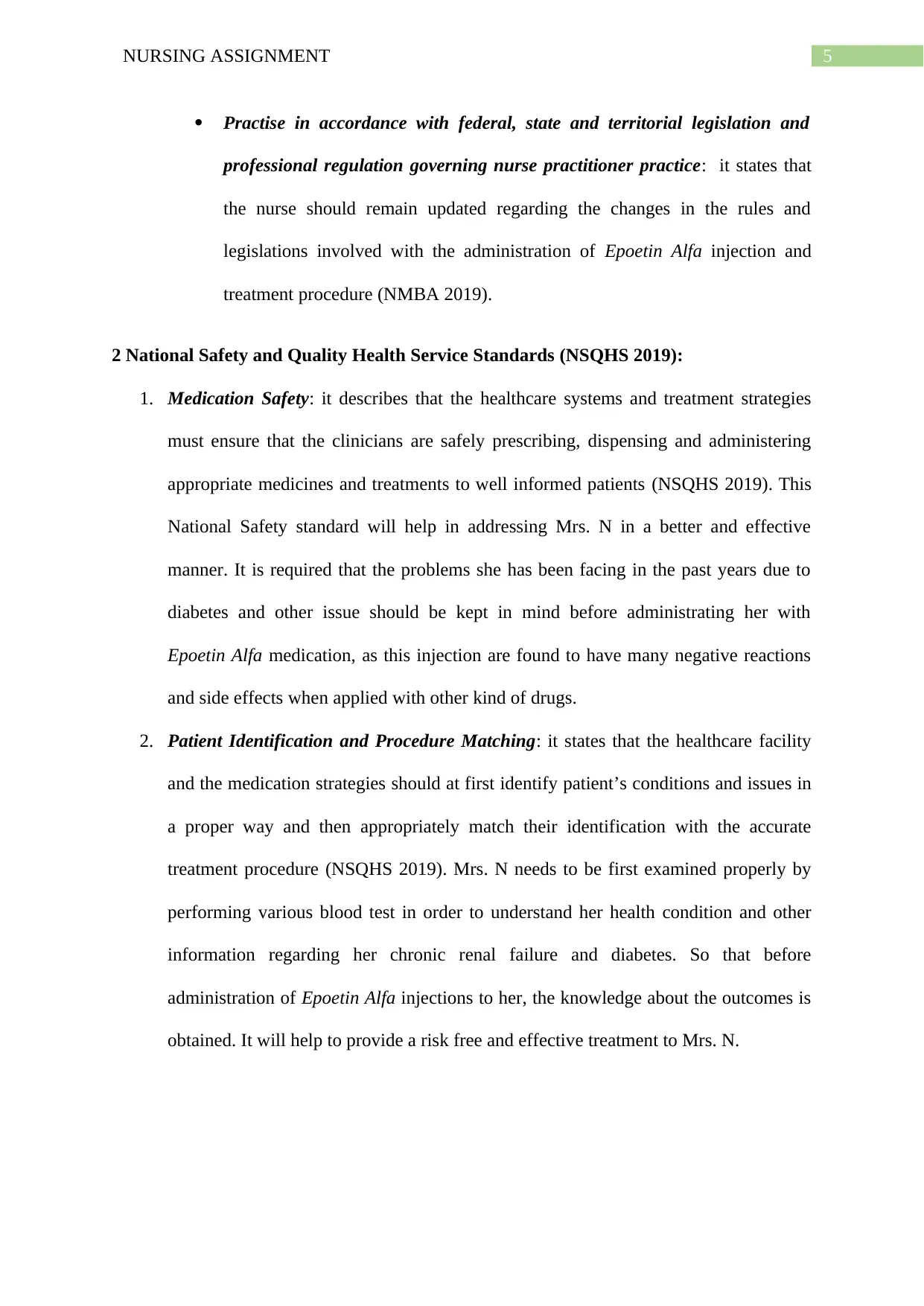
5NURSING ASSIGNMENT
Practise in accordance with federal, state and territorial legislation and
professional regulation governing nurse practitioner practice: it states that
the nurse should remain updated regarding the changes in the rules and
legislations involved with the administration of Epoetin Alfa injection and
treatment procedure (NMBA 2019).
2 National Safety and Quality Health Service Standards (NSQHS 2019):
1. Medication Safety: it describes that the healthcare systems and treatment strategies
must ensure that the clinicians are safely prescribing, dispensing and administering
appropriate medicines and treatments to well informed patients (NSQHS 2019). This
National Safety standard will help in addressing Mrs. N in a better and effective
manner. It is required that the problems she has been facing in the past years due to
diabetes and other issue should be kept in mind before administrating her with
Epoetin Alfa medication, as this injection are found to have many negative reactions
and side effects when applied with other kind of drugs.
2. Patient Identification and Procedure Matching: it states that the healthcare facility
and the medication strategies should at first identify patient’s conditions and issues in
a proper way and then appropriately match their identification with the accurate
treatment procedure (NSQHS 2019). Mrs. N needs to be first examined properly by
performing various blood test in order to understand her health condition and other
information regarding her chronic renal failure and diabetes. So that before
administration of Epoetin Alfa injections to her, the knowledge about the outcomes is
obtained. It will help to provide a risk free and effective treatment to Mrs. N.
Practise in accordance with federal, state and territorial legislation and
professional regulation governing nurse practitioner practice: it states that
the nurse should remain updated regarding the changes in the rules and
legislations involved with the administration of Epoetin Alfa injection and
treatment procedure (NMBA 2019).
2 National Safety and Quality Health Service Standards (NSQHS 2019):
1. Medication Safety: it describes that the healthcare systems and treatment strategies
must ensure that the clinicians are safely prescribing, dispensing and administering
appropriate medicines and treatments to well informed patients (NSQHS 2019). This
National Safety standard will help in addressing Mrs. N in a better and effective
manner. It is required that the problems she has been facing in the past years due to
diabetes and other issue should be kept in mind before administrating her with
Epoetin Alfa medication, as this injection are found to have many negative reactions
and side effects when applied with other kind of drugs.
2. Patient Identification and Procedure Matching: it states that the healthcare facility
and the medication strategies should at first identify patient’s conditions and issues in
a proper way and then appropriately match their identification with the accurate
treatment procedure (NSQHS 2019). Mrs. N needs to be first examined properly by
performing various blood test in order to understand her health condition and other
information regarding her chronic renal failure and diabetes. So that before
administration of Epoetin Alfa injections to her, the knowledge about the outcomes is
obtained. It will help to provide a risk free and effective treatment to Mrs. N.
⊘ This is a preview!⊘
Do you want full access?
Subscribe today to unlock all pages.

Trusted by 1+ million students worldwide
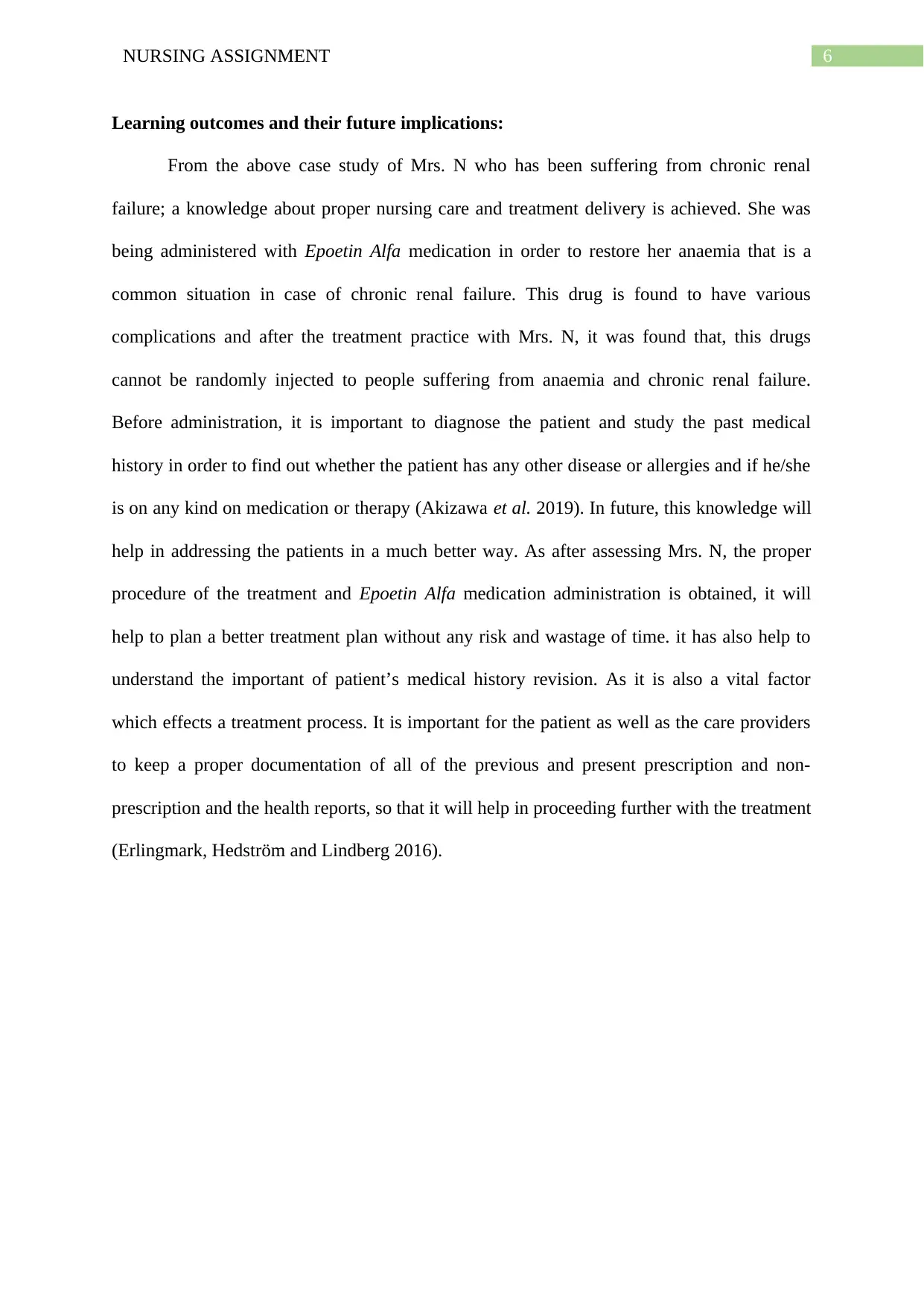
6NURSING ASSIGNMENT
Learning outcomes and their future implications:
From the above case study of Mrs. N who has been suffering from chronic renal
failure; a knowledge about proper nursing care and treatment delivery is achieved. She was
being administered with Epoetin Alfa medication in order to restore her anaemia that is a
common situation in case of chronic renal failure. This drug is found to have various
complications and after the treatment practice with Mrs. N, it was found that, this drugs
cannot be randomly injected to people suffering from anaemia and chronic renal failure.
Before administration, it is important to diagnose the patient and study the past medical
history in order to find out whether the patient has any other disease or allergies and if he/she
is on any kind on medication or therapy (Akizawa et al. 2019). In future, this knowledge will
help in addressing the patients in a much better way. As after assessing Mrs. N, the proper
procedure of the treatment and Epoetin Alfa medication administration is obtained, it will
help to plan a better treatment plan without any risk and wastage of time. it has also help to
understand the important of patient’s medical history revision. As it is also a vital factor
which effects a treatment process. It is important for the patient as well as the care providers
to keep a proper documentation of all of the previous and present prescription and non-
prescription and the health reports, so that it will help in proceeding further with the treatment
(Erlingmark, Hedström and Lindberg 2016).
Learning outcomes and their future implications:
From the above case study of Mrs. N who has been suffering from chronic renal
failure; a knowledge about proper nursing care and treatment delivery is achieved. She was
being administered with Epoetin Alfa medication in order to restore her anaemia that is a
common situation in case of chronic renal failure. This drug is found to have various
complications and after the treatment practice with Mrs. N, it was found that, this drugs
cannot be randomly injected to people suffering from anaemia and chronic renal failure.
Before administration, it is important to diagnose the patient and study the past medical
history in order to find out whether the patient has any other disease or allergies and if he/she
is on any kind on medication or therapy (Akizawa et al. 2019). In future, this knowledge will
help in addressing the patients in a much better way. As after assessing Mrs. N, the proper
procedure of the treatment and Epoetin Alfa medication administration is obtained, it will
help to plan a better treatment plan without any risk and wastage of time. it has also help to
understand the important of patient’s medical history revision. As it is also a vital factor
which effects a treatment process. It is important for the patient as well as the care providers
to keep a proper documentation of all of the previous and present prescription and non-
prescription and the health reports, so that it will help in proceeding further with the treatment
(Erlingmark, Hedström and Lindberg 2016).
Paraphrase This Document
Need a fresh take? Get an instant paraphrase of this document with our AI Paraphraser
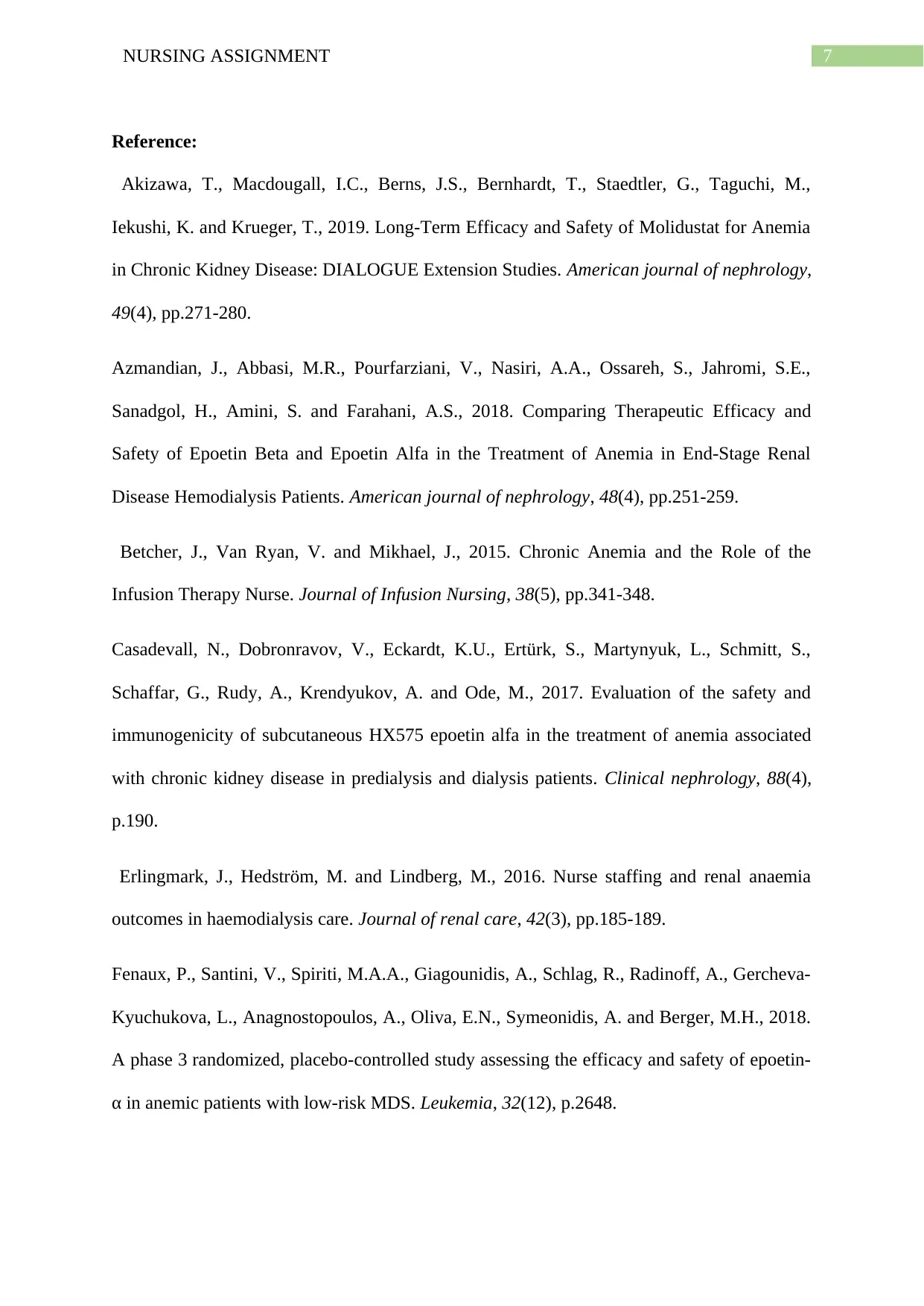
7NURSING ASSIGNMENT
Reference:
Akizawa, T., Macdougall, I.C., Berns, J.S., Bernhardt, T., Staedtler, G., Taguchi, M.,
Iekushi, K. and Krueger, T., 2019. Long-Term Efficacy and Safety of Molidustat for Anemia
in Chronic Kidney Disease: DIALOGUE Extension Studies. American journal of nephrology,
49(4), pp.271-280.
Azmandian, J., Abbasi, M.R., Pourfarziani, V., Nasiri, A.A., Ossareh, S., Jahromi, S.E.,
Sanadgol, H., Amini, S. and Farahani, A.S., 2018. Comparing Therapeutic Efficacy and
Safety of Epoetin Beta and Epoetin Alfa in the Treatment of Anemia in End-Stage Renal
Disease Hemodialysis Patients. American journal of nephrology, 48(4), pp.251-259.
Betcher, J., Van Ryan, V. and Mikhael, J., 2015. Chronic Anemia and the Role of the
Infusion Therapy Nurse. Journal of Infusion Nursing, 38(5), pp.341-348.
Casadevall, N., Dobronravov, V., Eckardt, K.U., Ertürk, S., Martynyuk, L., Schmitt, S.,
Schaffar, G., Rudy, A., Krendyukov, A. and Ode, M., 2017. Evaluation of the safety and
immunogenicity of subcutaneous HX575 epoetin alfa in the treatment of anemia associated
with chronic kidney disease in predialysis and dialysis patients. Clinical nephrology, 88(4),
p.190.
Erlingmark, J., Hedström, M. and Lindberg, M., 2016. Nurse staffing and renal anaemia
outcomes in haemodialysis care. Journal of renal care, 42(3), pp.185-189.
Fenaux, P., Santini, V., Spiriti, M.A.A., Giagounidis, A., Schlag, R., Radinoff, A., Gercheva-
Kyuchukova, L., Anagnostopoulos, A., Oliva, E.N., Symeonidis, A. and Berger, M.H., 2018.
A phase 3 randomized, placebo-controlled study assessing the efficacy and safety of epoetin-
α in anemic patients with low-risk MDS. Leukemia, 32(12), p.2648.
Reference:
Akizawa, T., Macdougall, I.C., Berns, J.S., Bernhardt, T., Staedtler, G., Taguchi, M.,
Iekushi, K. and Krueger, T., 2019. Long-Term Efficacy and Safety of Molidustat for Anemia
in Chronic Kidney Disease: DIALOGUE Extension Studies. American journal of nephrology,
49(4), pp.271-280.
Azmandian, J., Abbasi, M.R., Pourfarziani, V., Nasiri, A.A., Ossareh, S., Jahromi, S.E.,
Sanadgol, H., Amini, S. and Farahani, A.S., 2018. Comparing Therapeutic Efficacy and
Safety of Epoetin Beta and Epoetin Alfa in the Treatment of Anemia in End-Stage Renal
Disease Hemodialysis Patients. American journal of nephrology, 48(4), pp.251-259.
Betcher, J., Van Ryan, V. and Mikhael, J., 2015. Chronic Anemia and the Role of the
Infusion Therapy Nurse. Journal of Infusion Nursing, 38(5), pp.341-348.
Casadevall, N., Dobronravov, V., Eckardt, K.U., Ertürk, S., Martynyuk, L., Schmitt, S.,
Schaffar, G., Rudy, A., Krendyukov, A. and Ode, M., 2017. Evaluation of the safety and
immunogenicity of subcutaneous HX575 epoetin alfa in the treatment of anemia associated
with chronic kidney disease in predialysis and dialysis patients. Clinical nephrology, 88(4),
p.190.
Erlingmark, J., Hedström, M. and Lindberg, M., 2016. Nurse staffing and renal anaemia
outcomes in haemodialysis care. Journal of renal care, 42(3), pp.185-189.
Fenaux, P., Santini, V., Spiriti, M.A.A., Giagounidis, A., Schlag, R., Radinoff, A., Gercheva-
Kyuchukova, L., Anagnostopoulos, A., Oliva, E.N., Symeonidis, A. and Berger, M.H., 2018.
A phase 3 randomized, placebo-controlled study assessing the efficacy and safety of epoetin-
α in anemic patients with low-risk MDS. Leukemia, 32(12), p.2648.
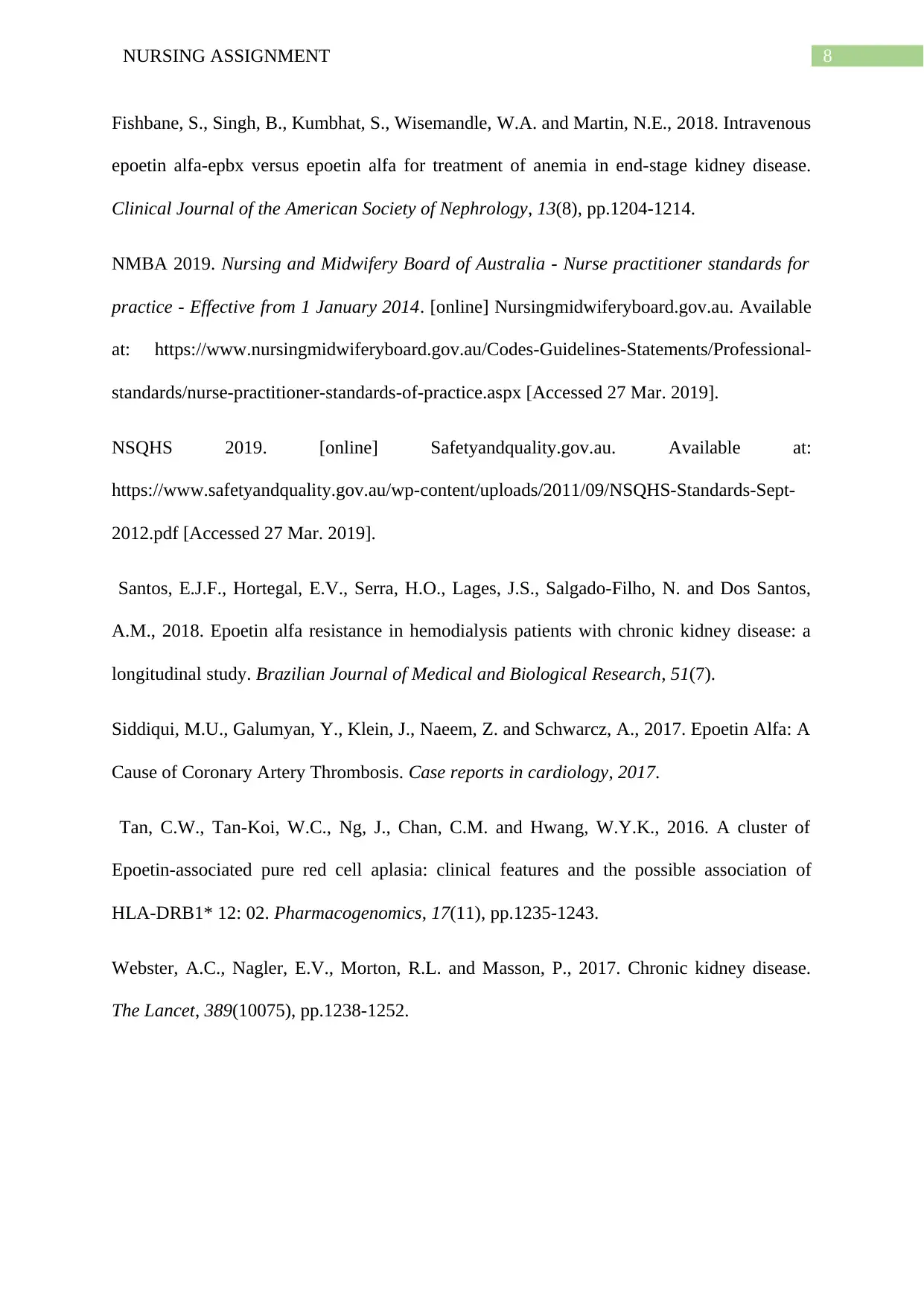
8NURSING ASSIGNMENT
Fishbane, S., Singh, B., Kumbhat, S., Wisemandle, W.A. and Martin, N.E., 2018. Intravenous
epoetin alfa-epbx versus epoetin alfa for treatment of anemia in end-stage kidney disease.
Clinical Journal of the American Society of Nephrology, 13(8), pp.1204-1214.
NMBA 2019. Nursing and Midwifery Board of Australia - Nurse practitioner standards for
practice - Effective from 1 January 2014. [online] Nursingmidwiferyboard.gov.au. Available
at: https://www.nursingmidwiferyboard.gov.au/Codes-Guidelines-Statements/Professional-
standards/nurse-practitioner-standards-of-practice.aspx [Accessed 27 Mar. 2019].
NSQHS 2019. [online] Safetyandquality.gov.au. Available at:
https://www.safetyandquality.gov.au/wp-content/uploads/2011/09/NSQHS-Standards-Sept-
2012.pdf [Accessed 27 Mar. 2019].
Santos, E.J.F., Hortegal, E.V., Serra, H.O., Lages, J.S., Salgado-Filho, N. and Dos Santos,
A.M., 2018. Epoetin alfa resistance in hemodialysis patients with chronic kidney disease: a
longitudinal study. Brazilian Journal of Medical and Biological Research, 51(7).
Siddiqui, M.U., Galumyan, Y., Klein, J., Naeem, Z. and Schwarcz, A., 2017. Epoetin Alfa: A
Cause of Coronary Artery Thrombosis. Case reports in cardiology, 2017.
Tan, C.W., Tan-Koi, W.C., Ng, J., Chan, C.M. and Hwang, W.Y.K., 2016. A cluster of
Epoetin-associated pure red cell aplasia: clinical features and the possible association of
HLA-DRB1* 12: 02. Pharmacogenomics, 17(11), pp.1235-1243.
Webster, A.C., Nagler, E.V., Morton, R.L. and Masson, P., 2017. Chronic kidney disease.
The Lancet, 389(10075), pp.1238-1252.
Fishbane, S., Singh, B., Kumbhat, S., Wisemandle, W.A. and Martin, N.E., 2018. Intravenous
epoetin alfa-epbx versus epoetin alfa for treatment of anemia in end-stage kidney disease.
Clinical Journal of the American Society of Nephrology, 13(8), pp.1204-1214.
NMBA 2019. Nursing and Midwifery Board of Australia - Nurse practitioner standards for
practice - Effective from 1 January 2014. [online] Nursingmidwiferyboard.gov.au. Available
at: https://www.nursingmidwiferyboard.gov.au/Codes-Guidelines-Statements/Professional-
standards/nurse-practitioner-standards-of-practice.aspx [Accessed 27 Mar. 2019].
NSQHS 2019. [online] Safetyandquality.gov.au. Available at:
https://www.safetyandquality.gov.au/wp-content/uploads/2011/09/NSQHS-Standards-Sept-
2012.pdf [Accessed 27 Mar. 2019].
Santos, E.J.F., Hortegal, E.V., Serra, H.O., Lages, J.S., Salgado-Filho, N. and Dos Santos,
A.M., 2018. Epoetin alfa resistance in hemodialysis patients with chronic kidney disease: a
longitudinal study. Brazilian Journal of Medical and Biological Research, 51(7).
Siddiqui, M.U., Galumyan, Y., Klein, J., Naeem, Z. and Schwarcz, A., 2017. Epoetin Alfa: A
Cause of Coronary Artery Thrombosis. Case reports in cardiology, 2017.
Tan, C.W., Tan-Koi, W.C., Ng, J., Chan, C.M. and Hwang, W.Y.K., 2016. A cluster of
Epoetin-associated pure red cell aplasia: clinical features and the possible association of
HLA-DRB1* 12: 02. Pharmacogenomics, 17(11), pp.1235-1243.
Webster, A.C., Nagler, E.V., Morton, R.L. and Masson, P., 2017. Chronic kidney disease.
The Lancet, 389(10075), pp.1238-1252.
⊘ This is a preview!⊘
Do you want full access?
Subscribe today to unlock all pages.

Trusted by 1+ million students worldwide

9NURSING ASSIGNMENT
1 out of 10
Related Documents
Your All-in-One AI-Powered Toolkit for Academic Success.
+13062052269
info@desklib.com
Available 24*7 on WhatsApp / Email
![[object Object]](/_next/static/media/star-bottom.7253800d.svg)
Unlock your academic potential
Copyright © 2020–2026 A2Z Services. All Rights Reserved. Developed and managed by ZUCOL.





